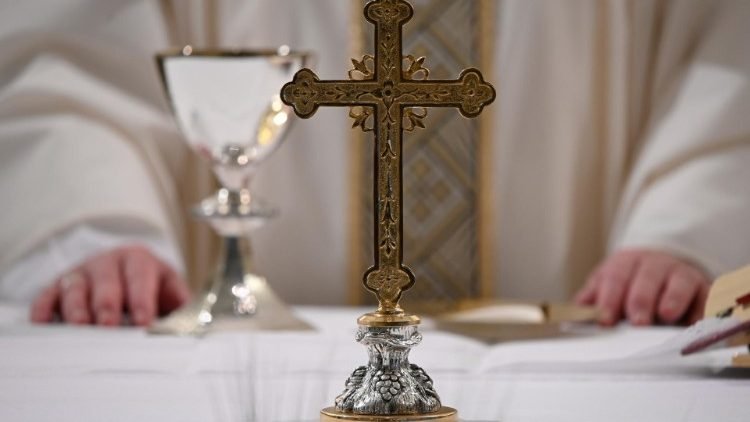The second article in the “Living through the Crisis” series of reflections from Father Federico Lombardi. The emergency situation we are experiencing, and the strain of living without the Eucharist, leads us to rediscover “spiritual Communion”.
By Federico Lombardi
When those of us who are now old were children, during catechism we were often told about “spiritual communion”. They told us that we could unite ourselves spiritually to Jesus who offers Himself upon the altar, even if were not able to make a sacramental communion by receiving physically the consecrated Host.
“Spiritual communion” was a religious practice that aimed at making us feel continuously united to Jesus, not only when we received Communion during Mass, but also at other times and places. It was not an alternative to sacramental Communion, but in a certain sense continued and prepared for it, for example during visits to the Blessed Sacrament or at other times of prayer.
But after a certain point in time, we heard practically nothing more about it – for decades. The emphasis on participation at Mass by receiving Communion, which is certainly good in itself, had led to other traditional dimensions of Christian devotion being overshadowed.
I began to think again, more intensely, about “spiritual Communion” on one exceptional occasion. During World Youth Day in Madrid in 2011, a sudden storm during the night destroyed most of the tents where the unconsecrated hosts were being prepared in anticipation of the more than two million young people expected for the final Mass. And so, at the main Mass celebrated by the Pope, only a very few of the young people were able to receive sacramental Communion, precisely because there were so few Hosts.
Many people were upset, at least at first. It seemed to some as if World Youth Day had failed, because something essential was missing from the culminating religious moment of the event. It took a lot of time and energy to help people understand that, although the physical act of receiving the Sacred Host is exceptionally important, it is not the only, indispensable manner of being united with Jesus and His Body, the Church.
Now, during his morning Mass at Santa Marta, Pope Francis encourages the faithful who pray with him, without being physically present, to make a “spiritual Communion”. He does so by proposing one of the traditional formulas that for a long time had been taught by the good spiritual masters of the Christian people: formulas that were familiar to many of our mothers and grandmothers, those who got up early in the morning, sometimes every day, to go to Mass – but who also knew how to remain in union with God, in their own way, in the midst of their daily occupations.
Among the memories from the time of my catechism, I am reminded of a holy card with a little picture of a priest raising the consecrated Host in his hands. Around the image, like the hours on a clock, there were the morning hours of different countries and continents where priests would be celebrating Mass. (At the time, Mass was only celebrated in the morning!) It was meant to remind us that the Sacrifice of Jesus, Who died for us, was being continually renewed around the world, and that we could always unite ourselves spiritually with Him and His oblation.
“Spiritual Communion”, when one cannot receive sacramental Communion, can also be called “Communion of desire”: desiring that one’s own life be united to Jesus, and especially to His Sacrifice for us upon the Cross.
In this prolonged time of Eucharistic fasting that is forced upon us, many people who are accustomed to frequent sacramental Communion are increasingly feeling the lack of the “daily Bread” of the Eucharist. In a truly exceptional way, it has been the Church herself who accepted the burden of imposing this fast on the faithful, as a sign of solidarity and participation in the concerns of entire populations forced into restrictions, privations, and suffering because of the pandemic.
Fasting is a deprivation, but it can also be a time of growth. Just as the love of spouses who have long been distant from each other on account of force majeure can lead to growth in fidelity and purity, so too Eucharistic fasting can become a time of growth: growth in faith, growth in desire for the gift of sacramental Communion, growth in solidarity with those who for whatever reason cannot benefit from it, growth in freedom from habits of carelessness in receiving… To come to understand anew that the Eucharist is a gratuitous and surprising gift of the Lord Jesus, neither trivial nor banal… to desire it with all one’s heart… continually… Can this also be a consequence of these disturbing times?



